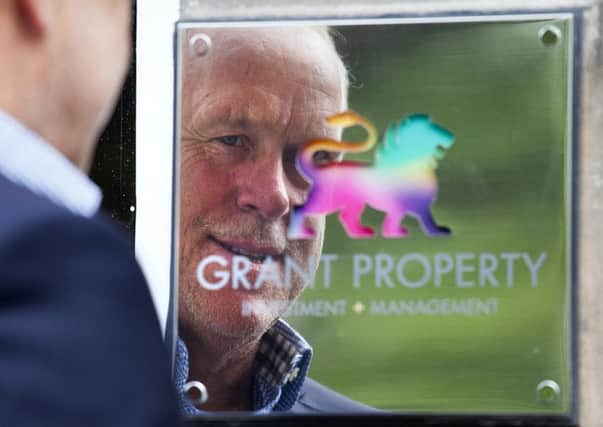Monday interview: Grant Property co-founder Peter Grant
This article contains affiliate links. We may earn a small commission on items purchased through this article, but that does not affect our editorial judgement.


But it was during this period that he started sowing the seeds for forming Edinburgh property investment and management firm Grant Property.
Having done a degree in business studies in Aberdeen, he joined a local newspaper group as a sales rep, working his way up the ranks and being moved around the UK every couple of years. “Every time I moved to a new place, I’d buy a run-down property and then I’d do it up,” he recalls.
Advertisement
Hide AdAdvertisement
Hide Ad“Then, when I came to move, I would sell it at a profit. That kind of ‘got it in my blood’ a bit.”
He also realised that it made him more money than his salary did. He later spent a spell working for The Scotsman, which brought him back to Edinburgh. After doing a finance-based MBA to diversify his skills, he spent time with John Menzies’ distribution arm in a role he describes as “poacher-turned-gamekeeper”.
This was followed by a return to the newspaper industry, later being made redundant, but he felt “there was just something inside me that always had this burning ambition to be either my own boss or to be the boss of someone else’s company. The route I finally went down was obviously starting my business from absolute scratch.”
He founded Grant Property in 1996 with his then-wife Colette, who retains a 50 per cent stake in the business. The company’s formation came after an initial buy-to-let purchase by the pair proved very successful and they kept adding to the portfolio. It also led to working with friends he knew from Aberdeen who had gone into the oil business, were working in the likes of the Middle East on good salaries and were looking to invest. They, in turn, put him in touch with other expats in locations like Singapore.
He says the firm’s growth was rapid, and 21 years after it started out, it now generates revenues of £12 million a year, covering about ten cities in the UK, with clients in 13 countries and having helped people invest “well over” 2,000 times. It also says it is unique in Britain in managing the whole journey from finding properties, refurbishing them, seeking out the tenants and then managing the lettings.
In Scotland it covers Edinburgh, Glasgow, Stirling, Dundee and Aberdeen, with other university cities south of the Border. The student and young professionals sectors are “where the real numbers are”, in Grant’s view.
Yet while the property market being inextricably linked with the economy is both its greatest and its most lucrative strength, it inevitably brings challenges when things are in a downward spiral.
Advertisement
Hide AdAdvertisement
Hide AdThe last financial crash saw the business downsize considerably, from about 140 staff to around 50, in what Grant admits was a highly stressful period – “especially when you start a company from scratch… you feel emotionally attached to it”.
But the business retrenched, overhauled its strategy to focus more on its overseas markets, “rebuilt the whole thing and drove it forward”.
With activity in the UK having come to a near-standstill, “I suddenly started spending a huge amount of time in the markets overseas where our investors were and which weren’t affected”.
These included the Middle East and Asia, looking at China in particular, with many of its overseas clients British expats. Until then, the split of the firm’s business between the UK and overseas was 50:50, but when the financial crisis took hold this changed to 10:90.
A joint venture with Bank of Scotland, which Grant says partly came about as institutions began to look at residential property as a way of investing pension money, also ran aground when the bank folded. That said, Grant is “proud to say we survived” and the financial crisis in fact made the rental sector stronger.
Furthermore, despite his initial fears of another financial crisis after the Brexit vote (“I went into a panic… we really didn’t know how to react and what to say to clients”), the move ended up leading to greater foreign investment in the UK.
As for the next few years, despite some industry concerns that UK buy-to-let yields for landlords will drop, Grant sees the rental market as extremely buoyant.
Advertisement
Hide AdAdvertisement
Hide AdConsequently, for the business he expects “more of the same… the confidence in the UK, and UK property, is really high”, and he also flags potential opportunities around crowdfunding initiatives, enabling people unable to invest in property outright to capitalise on buy-to-let.
All in all, it’s been “a short 21 years,” he laughs.
30-SECOND CV
Born: Haddington, 1961
Education: BA in business studies, MBA Edinburgh University, Dip Marketing
First job: Counting laps on a go-kart track, aged ten
Ambition while at school: To be a helicopter pilot
What car do you drive? Audi Q7. Ordered a sports car from a client who is starting to build cars
Music: I love Spotify. Favourite all-time band is The Eagles. Current favourite is Coldplay
Kindle or book? Book
Can’t live without: My skis. I might as well be dead
What makes you angry? People who don’t care
What inspires you? I see every day as a new adventure
Business icon: Probably one of the Sir Toms. (Hunter, Farmer).
Best business advice: Don’t listen to all the people who say “it’s not possible”